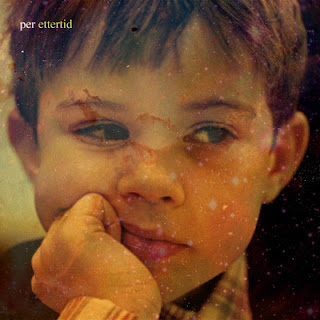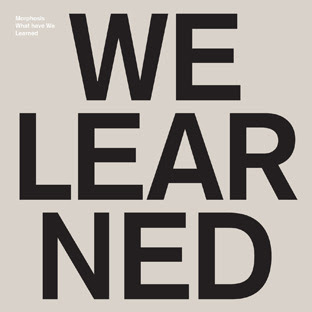
Well goodness me if I'm not actually reviewing an album you might have heard of. DJ Shadow has almost a million listeners on Last.fm, which makes him the most popular artist I've reviewed thus far on this blog by an absolute landslide. As a music fan, I almost never get to take part in these "pop moments". The closest I've come this year was Gang Gang Dance's album, and Gang Gang are hardly what the kids are listening to. Well, maybe the terribly hairstyled, charity-shop outfitted, mid-20s kids who wander around the student neighbourhoods, but I find those people bizarre and incomprehensible, so I definitely don't feel any sense of communal joy there.
DJ Shadow is not exactly Lady Gaga, or even Radiohead. There are definitely people I know who would ask "Who is he?", to which I would reply "Just your favourite DJ saviour" because I'm an obnoxious jizz-twat who thinks it's cool to reference obscure lyrics. But even so, DJ Shadow is pretty big. Endtroducing is one of
the classic albums of the 1990s, and also one of the classic albums of my adolescence, possibly my single favourite album of all time. It was one of those crucial albums at the age when I first started listening to full albums, around the age of 16 or 17, that I took everywhere on my CD Walkman and played to absolute death. I used to play half of it on the way to sixth form and play the second half on the way back. I used to play it when I walked the dog, I used to play it when I was depressed. I still play it around once a year, usually in the autumn when the leaves have fallen, and it still sounds as great as ever. I think Simon Reynolds summed it up perfectly when he said the album inspires what he called "Deep Time", the kind of child-like deep immersion you get from being totally lost in a great book. That's a feeling I get from a lot of my very favourite music, and Endtroducing is one of the greatest examples of all.
DJ Shadow, of course, suffered immensely from that classic grand narrative of the music world - the Perfect First Album, and the inevitable artistic struggles that resulted - struggles such as The Difficult Second Album and Should You Give Fans More Of The Same? It's perhaps no surprise that most of his subsequent albums have self-referential titles that implicitly discuss the artistic process. Titles like Private Press and The Outside seemed like oblique statements that Shadow was making the music for himself, rather than acquiescing to the expectations of his fanbase, while The Less You Know, The Better seems like a lament on the crippling feedback loop of the self-aware mature artist who can no longer just
create but is constantly thinking back to what he's already done, what people expect, what people want, what would surprise people. DJ Shadow, to me, is someone who badly wants to go back to the days when nobody knew who the fuck he was and he didn't know what the fuck he was doing, and he made the best, the most honest music of his life.
I honestly feel bad for Shadow, because he'll never get over Endtroducing. No matter how many dismissive comments he makes in interviews, no matter how much better he feels he is as an artist, that album is a soul-scrapingly genius work, one that the entire human collective will only top once or twice in a generation. Shadow is simply never going make a better record, and to have basically reached your artistic apex at the start of your career is a depressing thing. He knows he can't just remake Endtroducing - it will never be as good the second time around, so he tries to move forwards and do something totally different.
And to be fair to him, I have enjoyed his later stuff. The Outsider is generally agreed to have been a serious misstep, but The Private Press was a solid album and The Less You Know ain't half bad either. He has gone in an increasingly dancefloor-oriented direction as time has gone on, which is the opposite path most artists take but obviously reflects his desire to escape Endtroducing. True, The Less You know sounds like an inferior version of The Avalanches but it does have its moments. The theme of this album seems to be one of unrequited love, which results in a few extremely touching moments.
And since this has thus far been remarkably like a proper review with a thoughtful analysis of an artist's motives and statements, allow me to make it a 100% digital-diary entry blog post. Because this theme resonates with me quite hard. I was supposed to see DJ Shadow live when he was touring back in December. In fact, a girl who works at the venue asked me if I was going to come down. A girl I really like, and wanted to talk to. I couldn't make it because work spurned my request for the shift off, and I never got to see this girl. And although we tried to arrange to meet up a couple of times after that, it couldn't happen then either for various different reasons. In the end I was so frustrated by the situation I tried too hard to force it to happen. I got a little too bossy with this girl when she really wasn't in the right place to be bossed about. And she fell out with me, and we haven't spoken since. I sent her a text last night and she didn't reply, and now I'm sat here with the depressing knowledge that I've fucked it up and this girl is ignoring me, probably forever.
Now honestly, I didn't know this girl awfully well, but I did know her well enough to know she was an extremely cool, smart and funny person, a lot more beautiful than she seemed to realise, and I even know that she kind of liked me, that if I'd not been such a clown I might actually have found some happiness with her. So when, on this album, on tracks like I've Been Trying, a sampled blues man sings:
I've been trying to get you to love me
I've been trying to make you care
I've put forth a lot of effort
But I just don't seem to get nowhere...it hits hard, it makes me feel like crying. The theme continues throughout the album. On the next track, Sad And Lonely, a beautifully sad woman sings: "Young ladies take a warning / Don't waste your affections on a young man so free". It reaches a peak on the astonishingly powerful Give Me Back The Nights, which uses a recording of a forgotten amateur poet reciting one of his pieces, in which he laments the endless years of his life he wasted, lonely, chasing the love of people who spurned him. By this point in the album I'm just about ready to kill myself.
Now honestly, this isn't a great album. There's a big slew of tracks in the middle that are boring and forgettable as hell. But on these little moments, the album resonates with me. It speaks to me about my problems, my heartache, my struggles. For the rest of my life, when I listen to this record I'm going to think back to that girl and the moment I fucked it all up. This is far from the best album of 2011, but of everything I hear all year, this one might be the single one in years to come that actually makes me remember the time, the things I cared about, the mistakes I made, the things that might have been.
Genre: Hip-hop
Stupid Arbitrary Rating: 7/10




















